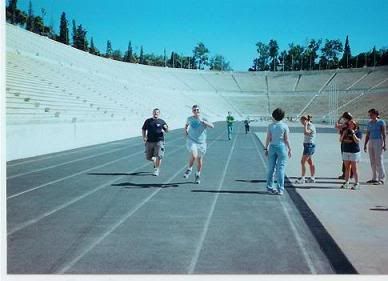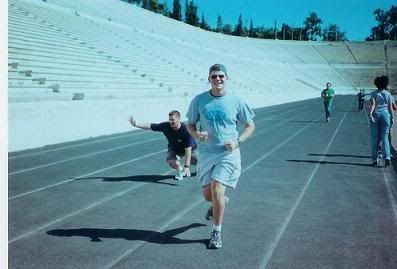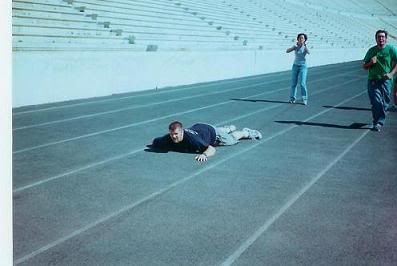Since my last post was more than a month ago, I decided that to help me be more regular about it I would post my sermons from each sunday. This will also help me to prepare better and write them out. It will also allow me to share my sermons with more than the 10 people who I worship with at the Cottonwood church of Christ. Let me know what you think.
Sermon:
Imagine a family that has been through the ringer because of health conditions. They have been in and out of hospitals because the father in the family has had heart problems as long as they can remember. It all started with a heart attack and progressively got worse. One doctor would tell the family one thing and give him medication. When that didn’t work, they went to another doctor who said something different and gave them a different medication. Over time they lost their faith in the medical field and the ability of doctors to heal the father. They tried herbal medicine with sadly the same results. Now, a Christian friend begins reading the bible with him as he lies in a hospital bed and they get to James 5. He hears, “Are any among you suffering, he should pray” and recalls times when he cried out to God just wanting to know why all this was happening to him. He’s tried praying many times before but as usual his heart condition only got worse. His friend continues reading, “Are any cheerful? They should sing songs of praise. Are any among you sick?” Upon hearing this, the father’s eyes open wide. He thinks that maybe, just maybe he will hear some super spiritual cure that will free him from hospital beds for the rest of his life. What he hears next is puzzling. “They should call for the elders of the church and have them pray over them, anointing them with oil in the name of the Lord.” The father lies there wondering if the cure to all his problems has been sitting on a shelf in his pantry at home the whole time. Then he thinks, maybe the Christians have some sort of special oil that no one else knows about. He wonders how he can get a hold of some of this oil and maybe some elders to anoint him while he’s at it. Then he stops, his thought bubble is popped by what his Christian friend says next, “The prayer of faith will save the sick, and the Lord will raise them up; and anyone who has committed sins will be forgiven.
Maybe you are wondering the same thing as the father. What does the forgiveness of sins have to do with the healing of the sick?
When you read this passage it appears that the two are intimately connected. If you are like me, you have a lot of red flags going up inside your head. There are a lot of questions that are brought to mind.
Don’t sins have to do with the spiritual realm and sickness with the physical?
What does confessing sins have to do with getting well?
It is really a spiritual sickness James is talking about?
I don’t see elders anointing people with oil these days, why not?
Does anointing heads with oil have any value in healing the sick at all?
If anointing, which is a physical act, doesn’t have any significance how can
praying, which is a spiritual act, help?
The more I read this passage, the more questions I had. I thought about not preaching it because there were so many questions I had. I’m doing a series on prayer and this passage talks a lot about prayer. Should I neglect it simply because I don’t understand it?
So I read it again.
James 5:13-16
13 Are any among you suffering? They should pray. Are any cheerful? They should sing songs of praise. 14 Are any among you sick? They should call for the elders of the church and have them pray over them, anointing them with oil in the name of the Lord. 15 The prayer of faith will save the sick, and the Lord will raise them up; and anyone who has committed sins will be forgiven. 16 Therefore confess your sins to one another, and pray for one another, so that you may be healed. The prayer of the righteous is powerful and effective.
The prayer of the righteous is powerful and effective.
As I read it over and over again, I realized that this passage talks about two different aspects of the life of the Christian.
The first one describes how our personal relationship with God suffers when there is sin in our lives.
The second talks about how no matter what the circumstance we are in, we are to pray.
How does sin impact our relationship with God?
Are we to believe that no matter how sick we are, if we only confess our sins, we will be healed? I would love it if this were true, but you and I can both look at the lives of truly righteous, God loving people and know that they do not deserve what they are going through.
So what does James mean when he says, “confess your sins…so you may be healed?”
I think the answer comes when we read that last line over again.
The prayer of the righteous is powerful and effective.
There’s something about my prayers that are hindered when I am living an unrighteous life. Can God still hear you when you pray if you are sinning? I believe he can. Can God still act as the Great Physician on your behalf when you haven’t been willing place yourself under his knife so he can help you? I believe as I have said before, God is more faithful than we are. So what about our sinful lives keep us from enjoying the benefits of his grace here on earth?
Lets look at Hebrews 12
Therefore, since we are surrounded by so great a cloud of witnesses, let us also lay aside every weight and the sin that clings so closely,a and let us run with perseverance the race that is set before us, 2 looking to Jesus the pioneer and perfecter of our faith, who for the sake ofb the joy that was set before him endured the cross, disregarding its shame, and has taken his seat at the right hand of the throne of God.
3 Consider him who endured such hostility against himself from sinners,c so that you may not grow weary or lose heart. 4 In your struggle against sin you have not yet resisted to the point of shedding your blood. 5 And you have forgotten the exhortation that addresses you as children—
“My child, do not regard lightly the discipline of the Lord,
or lose heart when you are punished by him;
6 for the Lord disciplines those whom he loves,
and chastises every child whom he accepts.”
7 Endure trials for the sake of discipline. God is treating you as children; for what child is there whom a parent does not discipline? 8 If you do not have that discipline in which all children share, then you are illegitimate and not his children. 9 Moreover, we had human parents to discipline us, and we respected them. Should we not be even more willing to be subject to the Father of spirits and live? 10 For they disciplined us for a short time as seemed best to them, but he disciplines us for our good, in order that we may share his holiness. 11 Now, discipline always seems painful rather than pleasant at the time, but later it yields the peaceful fruit of righteousness to those who have been trained by it.
12 Therefore lift your drooping hands and strengthen your weak knees, 13 and make straight paths for your feet, so that what is lame may not be put out of joint, but rather be healed.
Did you catch that part in the middle?
“Consider him who endured such hostility so that you may not lose heart.”
Jesus paid too high a price for me and you to keep ourselves from running the race marked out for us by the burdens of sin.
Did you catch that other part in the middle?
“My child, do not regard lightly the discipline of the Lord,
or lose heart when you are punished by him;
for the Lord disciplines those whom he loves,
and chastises every child whom he accepts.”
We may go through difficult times while we are here but the discipline we learn from them yields the, “peaceful fruit of righteousness.”
When we develop the discipline of dependence on God even in hard times knowing that we can’t only attribute the good things in our lives to God but also sometimes the bad things, we will be at peace with him.
The prayer of the righteous is powerful and effective because it is a prayer that has been tested through times of suffering and through times of cheer.
1 Thess 5:17 admonishes us to “Pray without ceasing.” I’m convinced that this means we are to pray in good times or in bad. It means we are to pray for ourselves and for others. It means we are to pray with the conviction that our prayers can change the whole way we live. Our prayer lives reflect our daily lives. This poem I found sums it up well.
I knelt to pray when day was done,
And prayed, “O Lord bless every one,
Lift from every saddened heart the pain,
And let the sick be well again.”
And then I woke another day,
And carelessly went upon my way.
The whole day long I did not try
To wipe a tear from any eye.
I did not try to share the load
Of any brother on the road.
I did not even go to see
The sick man just next door to me.
Yet once again when day was done,
I prayed, “O Lord bless everyone.”
But as I prayed, unto my ear
There came a voice that whispered clear,
“Pause, hypocrite, before you pray,
Whom have you tried to bless today?
God’s sweetest blessings always go,
By hands which serve Him below.”
And then I hid my face and cried,
“Forgive me, God, for I have lied.
Let me but live another day,
And I will live the way I pray!”
If our prayer lives really do reflect our daily lives, then we have something to think about. How does my daily life reflect my prayer life? If I am not praying at all, it will be easy to tell just by looking at my life. If I am living a life of sin, my prayers will be empty and void of any sincerity. On the other hand if I have thrown off the things that hinder me from running the race God has set out for me, my prayers will be impacted. God will be able to use me because he knows that I am depending on him in all my troubles. He sees your righteousness and makes you prayers powerful and effective.

Powerful and Effective


